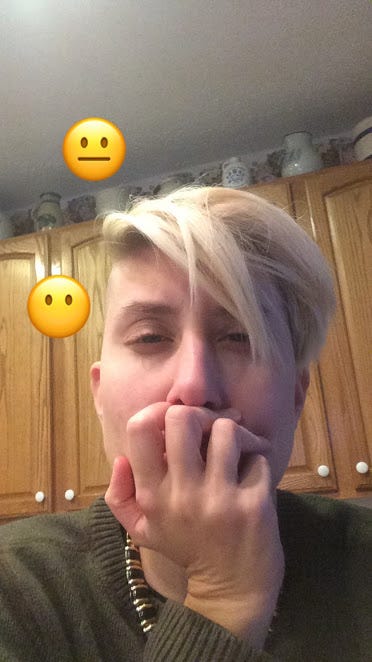What would happen if I never took another selfie again?
My Millennial ass would probably curl up and die.
What would happen if I never took another selfie again? My Millennial ass would probably curl up and die.
In all seriousness, I love looking at the images of people I care about, and I love to document my evolving appearance through selfies. I love memoirs, and self-deprecating tweets, and long, florid navel-gazing emails from loved ones, and indulgent Snapchat stories, and self-portraits done in sculpture and pixel and paint.
It’s hard to find something distinctive about a photo of a mountain. Thousands of people can take equally acceptable photos of the same natural scene or tourist trap. But every person’s visage is unique to them — and it’s ever-changing in intentional and temporal ways.
On a more idiosyncratic level, selfies are important to me because they’re the only form of photography I’m comfortable subjecting myself to. Having my photo taken by other people makes me uncomfortable, because of gender dysphoria and neuroatypicality. How I look doesn’t always line up with how I feel, and I find it much harder to control and pose my body and face than the average person does. This has always been the case, and it’s always made me camera shy.
When I can’t control what the framing of the photo looks like, when I can’t see how my face looks on the screen (and adjust accordingly), I clam up, or freak out, and I invariably loath the resulting image. As a child, I used to flip out during school picture day because I couldn’t control my face, and couldn’t sit the way the photographer wanted. It caused endless problems for me, emotionally, and for the person taking the photograph, logistically. As an adult, I was still anxious to the point of tears having my photo taken at my PhD graduation. Before selfies became widely available, I avoided every opportunity to document my appearance that I could.
Selfies allow me to know what I look like, and to share that with the world — on my terms.
Selfies are not an exercise in narcissism. They’re a simple way to broadcast one’s continued existence to the world. They give us a means of connecting with people we don’t get to see every day, a little glimpse that reminds us of all we have to love. A phone or instagram feed full of selfies provides us with a historical record of our changing selfhoods. Selfies can be artistic, revealing, reflective, poignant, and funny. They can be masterfully crafted or mundane. They are as varied a medium as the people who create them, and to lose that medium is to lose much of the rich color and texture with which people express the events of their lives.
If you’ve given up on selfies and directed your lens outward and found it fulfilling, that’s wonderful. I’m glad your mountain photos are nourishing for you to take. But I’m keeping my selfies, and I hope the people I love keep sharing theirs with me, too.



